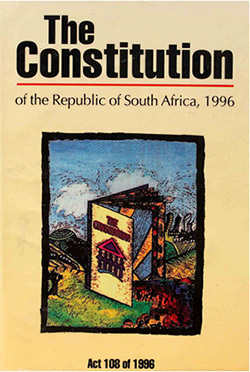What the constitution promises women
25 August 2015
Women's rights to life, dignity and privacy are well protected by the country's progressive Constitution, says Associate Professor Waheeda Amien (Department of Public Law). But it's particularly Section 9, the equality clause, that affords women specific protection against all forms of unfair discrimination. The law scholar takes a brief look at sections of the Constitution that have broadened political and civil freedom for women.
Section 9, the equality clause, is far-reaching, prohibiting unfair discrimination on the grounds of gender, sex, pregnancy, marital status, and sexual orientation.
Section 11, the right to life, affects issues such as domestic violence and femicide.
Section 12 concerns freedom and security of the person and the sub-section that applies specifically to women is 12(1)(c), which says everyone has the right to be free from all forms of violence from either public or private sources. 12(2) says everyone has the right to bodily and psychological integrity, which includes a woman?s right to make decisions concerning reproduction and to security in and control over her body.
Section 15 guarantees the individual's freedom of religion, belief and opinion. Section 15(3)(a)(i) and (ii) enables government to enact legislation to recognise either marriages or systems of personal law that are concluded under any religion or tradition. "But it also includes a rider in Section 15(3)(b), that: recognition in terms of paragraph (a) must be consistent with this section and other provisions of the Constitution. The Constutition says if you're going to enact law to recognise marriages or personal law systems founded in religion or tradition, it can?t violate among others, women's rights enshrined in the Bill of Rights."
Section 30 protects an individual's right to use her language and participate in the cultural life of her choice.
Section 31 recognises the collective right of members of a cultural, religious or linguistic community to among others, enjoy their culture, practise their religion and use their language in association with each other. In both instances, the Constitution requires that these individual and collective rights not be exercised in a way that infringes other rights in the Bill of Rights, inclusive of gender and sex equality.
"What's important," says Amien, "is that the Bill of Rights doesn?t just place obligations on the state to respect, protect, promote or fulfil rights. It also has what we call 'horizontal' application, which creates obligations between individuals.
"This has important ramifications in the private sphere, particularly regarding the kinds of abuse women suffer. The Constitution says that it's not just the state that has an obligation to ensure we?re able to live fulfilled lives, but that we have an obligation to each other to do that."
"Government has made an attempt to give effect, through legislation, to protect women?s rights. For example, the Domestic Violence Act offers remedies to survivors of domestic violence and the Sexual Offences Act has reformed the law relating to sexual offences. In addition, the Civil Union Act enables same-sex couples to access the same benefits that couples in civil marriages enjoy.
"It's also important to note that South Africa is a signatory to a host of international conventions and treaties," added Amien. "In particular, we have ratified the United Nations Convention on the Elimination of All Forms of Discrimination Against Women, which commits the country to incorporating provisions of the international treaty into its own legislation."
Compiled by Helen Swingler
 This work is licensed under a Creative Commons Attribution-NoDerivatives 4.0 International License.
This work is licensed under a Creative Commons Attribution-NoDerivatives 4.0 International License.
Please view the republishing articles page for more information.










